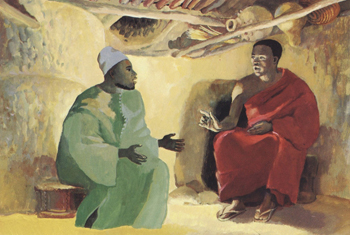For Sunday March 11, 2018
The Fourth Sunday in Lent
Lectionary Readings (Revised Common Lectionary, Year B)
Numbers 21: 4-9
Psalm 107:1-3, 17-22
Ephesians 2:1-10
John 3:14-21
John 3:16 was the first Bible verse I memorized as a child. In youth group, I learned that it’s essentially Christianity 101 — a perfect summary of Scripture’s salvific message, and a great evangelism tool. Over the years, I’ve seen the verse displayed on billboards, t-shirts, coffee mugs, and cross-stitch samplers. Martin Luther called it “the heart of the Bible, the Gospel in miniature.”
And so it is. In just twenty-seven words, the famous verse from St. John’s Gospel describes a loving God, a cherished world, a self-giving Son, a universal invitation, a deliverance from death, and a promise of eternal life. Christianity in a nutshell. So what’s the problem?
Not the verse itself, I would argue, but what we so often do with it. In our well-intentioned efforts to make the Gospel message simple and accessible, we Christians sometimes reduce salvation to a formula, forgetting that when Jesus originally spoke the words of John 3:16 to Nicodemus — a Pharisee, a member of the Sanhedrin, and likely one of the more erudite men of his day — his listener found Jesus’s words incomprehensible. If Jesus really intended to “save” Nicodemus by pithy soundbite that night, he failed. What the seeker experienced was not salvation; it was bewilderment.
Keeping this in mind, I wonder what my formulaic approach to John 3:16 leaves out. What does it prevent me from seeing about the Christian life? Do I lean so heavily on the second half of the verse — the importance of individual belief — that I minimize the stunning truth of the first — that God loves and longs for all of creation? Do I treat the verse as a litmus test, using it not to communicate God’s all-encompassing compassion and mercy, but to threaten unbelievers with God’s judgment? Do I allow my interpretation of the verse to flatten and distort the meaning of “belief,” reducing its nuance and complexity to mere intellectual assent? What does it mean, after all, to say, “I believe in Jesus?” Why is “belief,” of all things, so important to God?
 |
Growing up, I was taught that being a Christian means affirming the right things. To accept Jesus into my heart, to be "born again," was to agree to a set of doctrines about who Jesus is and what he accomplished through his death and resurrection. To enter into orthodox faith was to believe that certain theological statements about God, Jesus, the Holy Spirit, the human condition, the Bible, and the Church, were true. When we spoke of “growing in the faith,” what we meant was that we were honing our doctrinal commitments. To be a mature Christian was to have one's theological ducks in a row.
This honing, moreover, was a serious business. As a teenager, I watched congregations split up over the legitimacy of infant baptism over "believer's" baptism. I knew Christians who considered speaking in tongues a litmus test for faith. I heard pastors fight over whether the Communion table should be open (available to all) or closed (reserved for baptized members of a particular faith community). I heard others argue over the most nitpicky details concerning the “endtimes.” Would God take his children to heaven before the “great tribulation?” Or would they have to hang around and endure the birth pains of a new kingdom?
It's tempting to laugh, but for the people involved, none of these differences were funny or peripheral; they cut to the heart of what it means to be Christian. I fear that the same is true when I speak glibly of John 3:16 as “Christianity in a nutshell.” “For God so loved the world that he gave his only Son, so that everyone who believes in him may not perish but may have eternal life.” It sounds so gorgeously precise, so deceptively simple. But does all of Christianity really come down to my accepting certain propositions about Jesus to be factual? To be true? Is that really it?
For me, this way of believing — this way of defining faith as an intellectual assent to precisely codified doctrines — has fallen apart. Not because I can't assent, but because my assenting, in and of itself, hasn’t fostered anything close to the meaningful relationship I desire to have with God. If anything, my intellectual assent has functioned as a smokescreen. A distraction. A substitute.
 |
In her 2013 book, Christianity after Religion, historian Diana Butler Bass points out that the English word "believe" comes from the German "belieben" — the German word for love. To believe is not to hold an opinion. To believe is to treasure. To hold something beloved. To give my heart over to it without reservation. To believe in something is to invest it with my love.
This is true in the ancient languages of the Bible as well. When the writers of the Hebrew Bible and the New Testament wrote of faithfulness, they were not writing about an intellectual surrender to a factual truth. They were writing about fidelity, trust, and confidence. As they saw it, to believe in God was to place their full confidence in him. To throw their whole hearts, minds, and bodies into his hands.
The fact is, I can't think of any significant human relationships in which doctrine matters more than love and trust. So why should my relationship with God be any different? When I ask my husband, my children, or my friends to believe in me, I am not asking them to believe certain facts about me. I'm not saying: "Affirm without question that I’m 5'1, have curly black hair and brown skin, and live in California.” Rather, I am saying, "Dare to hang on. Dare to believe that I won’t let you go. Trust me with your heart. Trust me with your love, your faith, and your vulnerability. Allow yourself to treasure me as I have come to treasure you.”
Conversely, when one of my human relationships falls apart, the breakdown is never merely intellectual. What breaks between me and the other person isn't facts; what breaks is vulnerability, intimacy, and fidelity. What breaks is the deep, abiding trust that makes love and safety possible.
 |
What does it mean to believe in Jesus? To hold onto him? To trust him with my life? For Nicodemus, it meant starting anew, letting go of all he thought he understood about the life of faith. It meant being “born again,” becoming a newborn, vulnerable, hungry, and ready to receive reality in a brand new way. It meant coming out of the darkness and risking the light. None of this could be reduced to an altar call or a litmus test. The work of trusting Jesus was mind-bending, soul-altering work — it was hard, and it took time, and it involved setbacks, fears, and disappointments. No wonder Nicodemus walked away baffled that first night. Jesus was calling him to so much more than a rote recitation of the sinner’s prayer; he was calling him to fall in love, and stay in love. Why is belief important to God? Because love is. To believe is to be-love.
“Christianity in a nutshell” sounds catchy, but in the end, I don’t think it exists. John 3:16 is a beautiful passage of scripture, and we are right to recite it, memorize it, and cherish it. But the way of faith it points to is as vast and mysterious as all the workings of a human heart reaching out for God’s. That’s why we can trust it; its challenge corresponds to reality. No love as rich, demanding, costly, and free as God’s love for us can ever be reduced to a formula.
Image credits: (1) In God's Image; (2) Inspirations ~ from the Gospels; and (3) Wikipedia.org.





